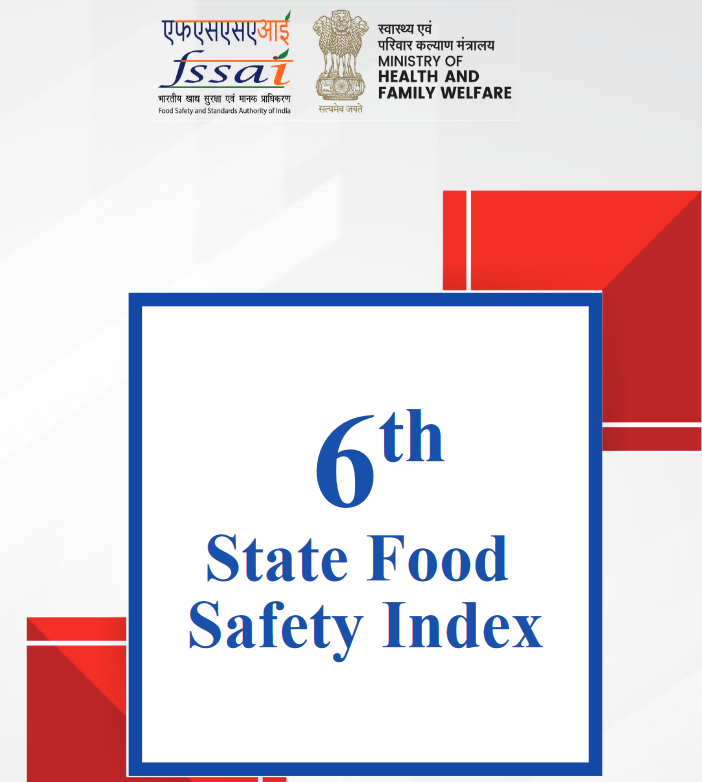- Courses
- GS Full Course 1 Year
- GS Full Course 2 Year
- GS Full Course 3 Year
- GS Full Course Till Selection
- Online Program
- GS Recorded Course
- NCERT (Recorded 500+ Hours)
- Polity Recorded Course
- Geography Recorded Course
- Economy Recorded Course
- AMAC Recorded Course
- Modern India, Post Independence & World History
- Environment Recoded Course
- Governance Recoded Course
- Science & Tech. Recoded Course
- International Relations and Internal Security Recorded Course
- Disaster Management Module Course
- Ethics Recoded Course
- Essay Recoded Course
- Current Affairs Recoded Course
- CSAT
- 5 LAYERED ARJUNA Mentorship
- Public Administration Optional
- ABOUT US
- OUR TOPPERS
- TEST SERIES
- FREE STUDY MATERIAL
- VIDEOS
- CONTACT US
State Food Safety Index 2023-24
State Food Safety Index 2023-24
- India’s federal system of government works through the central authority and states for better administration on various subjects. Both the national government and the states have the power to make laws, and both have autonomy on certain subjects.
- Food is one of the important subject on the concurrent list of the Indian federal system. The Food Safety and Standards Authority of India (FSSAI) is entrusted with ensuring public health by promoting food safety. The Food Authority at the centre and the State Food Safety Authorities jointly share this responsibility as delineated by the Food Safety and Standards Act 2006.
- To incentivize States and Union Territories (UTs) to enhance food safety within their regions, FSSAI announces the State Food Safety Index (SFSI) annually for each financial year since 2019.

Context
- In September 2024, 6th State Food Safety Index (SFSI) 2023-2024, released by the Food Safety and Standards Authority of India (FSSAI), evaluates the food safety performance of Indian states and union territories.
- All 36 states and union territories have been evaluated and ranked in SFSI index 2023-2024.
SFSI’s key parameters
The SFSI 2023-24 ranks States and Union Territories (UTs) based on their performance across following key parameters:
- Food Testing - Infrastructure and Surveillance (36%): It carries the highest weight at 36%, emphasizing the importance of having robust food testing facilities and surveillance measures in place.
- Compliance (28%): It is the second-most significant category with 28% of the total score.
- Improvement in Rank of States/UTs from State Food Safety Index 2022-2023 (10%): Improvement over previous rankings is given a 10% weight, incentivizing states to enhance their food safety performance over time.
- Human Resources and Institutional Data (9%): It accounts for 9% of the total score, highlighting the role of staffing and institutional data in food safety management.
- Consumer Empowerment and FSSAI Initiatives (9%): carrying 9% weight, focuses on efforts to educate and empower consumers regarding food safety and the initiatives undertaken by the Food Safety and Standards Authority of India (FSSAI).
- Training and Capacity Building (8%): Carrying at 8%, indicating a need for continuous development of skilled personnel and capacity-building activities to maintain food safety standards.
Key Findings of State Food Safety Index 2024
- Kerala topped the Index again and achieved over 100% of its inspection targets for FY24. It also:
- Strengthened its food-testing infrastructure.
- Organized special drives to increase the number of license-holders and registrations.
- Kerala, Tamil Nadu, West Bengal, Haryana and Arunachal Pradesh scored the maximum score of 17 in compliance.
- Nagaland received special recognition for making notable progress in improving its food safety ecosystem compared to the previous year.
- Goa popular tourist destination for foreign and domestic tourist scored low in compliance just marginally better than Jharkhand which scored the lowest.
- Kerala, Jammu and Kashmir and West Bengal scored the most in improvement in SFSI.
- No Union territory except Andaman and Nicobar showed any improvement in SFSI from previous year.
- Fifteen states scored zero on improvement in Rank of states from State Food Safety 2022-2023.
- Rajasthan scored the most in Human resource and Institutional data.
Top 5 and Bottom 5 States/UTs based on total scores |
|
|||
|
Top 5 Performer |
Bottom 5 Performer |
|
||
|
States/UTs |
Total Score |
States/UTs |
Total Score |
|
|
1. Kerala |
73.75 |
36. Lakshadweep |
9.5 |
|
|
2. Tamil Nadu |
67 |
35. Mizoram |
11 |
|
|
3. Jammu & Kashmir |
64.25 |
34. Puducherry |
12.5 |
|
|
4. Gujarat |
61.75 |
33. Dadra NH & DD |
19 |
|
|
5. Punjab |
56.75 |
32. Ladakh |
20.25 |
|
Central Initiatives for Food Safety
|
||||
Key Challenges
- Training and Capacity Building: Proper training and capacity building for all stakeholders, from farmers to food handlers and regulators, is crucial.
- It improves food safety standards and ensures the overall quality of the food supply chain.
- Enhancing Food Testing Capabilities: Establishing advanced food testing facilities is essential for effective monitoring and enforcement of food safety standards.
- Early detection of contaminants plays a key role in this process.
- Modernization and Integration of Infrastructure: Modernizing state-of-the-art infrastructure for rapid detection of food contaminants, along with mechanisms for fast analysis, data sharing, and decision-making, is necessary.
- This will positively impact ongoing national efforts for food system transformation.
- Strengthening Infrastructure: Increasing investment in better infrastructure, such as modern storage, transportation networks, and cold chain systems, is particularly needed for handling perishable goods.
- Consumer Awareness and Education: Educating consumers about proper food handling, storage, and preparation is critical to ensuring they can make informed choices
Food Safety and Standards Authority of India (FSSAI)
|
World Food Safety Day 2024Observed: 7 June (Every year) Theme for 2024: Food safety: prepare for the unexpected |
Practice Question
Q. With reference to the State Food Safety Index (SFSI), consider the following statements:
1. It is released by the Food Safety and Standards Authority of India (FSSAI).
2. The aim of the index is to foster competition and drive positive changes in the food safety ecosystem across the country.
3. Human resources and institutional capacity, and consumer empowerment are among the parameters of this index.
How many of the above statements is/are correct?
(a) Only one
(b) Only two
(c) All three
(d) None
Ans: c
Explanation
All the statements are correct.
Q. Consider the following statements: (UPSC Prelims 2018)
1. The Food Safety and Standards Act, 2006 replaced the Prevention of Food Adulteration Act, 1954.
2. The Food Safety and Standards Authority of India (FSSAI) is under the charge of Director General of Health Services in the Union Ministry of Health and Family Welfare.
Which of the statements given above is/are correct?
(a) 1 only
(b) 2 only
(c) Both 1 and 2
(d) Neither 1 nor 2
Ans: a




